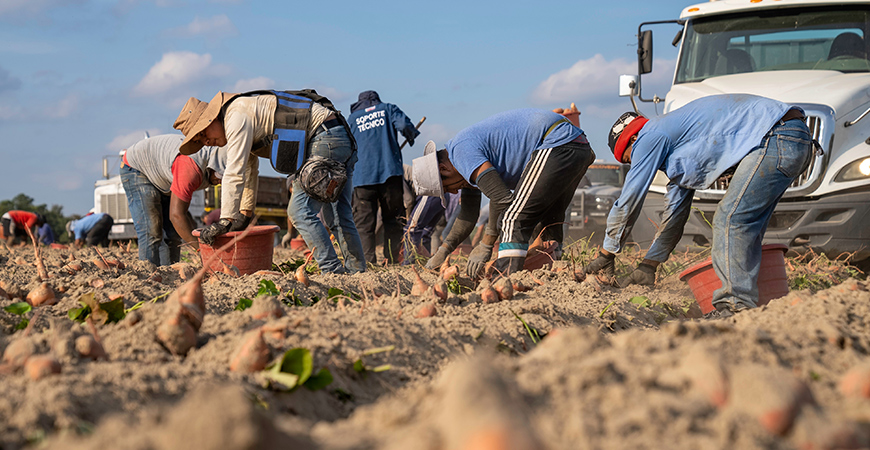
A new landmark study by the UC Merced Community and Labor Center shows farmworkers across California are facing serious health challenges on a daily basis.
The goal of the Farmworker Health Study was to examine agricultural worker health and well-being, in addition to health care access, local and state policies, and health and training needs.
More than 1,200 California farmworkers were surveyed between August 2021 and January 2022. They were asked about their working conditions, physical health, women's and reproductive health, COVID-19, use of preventive health services, health insurance and access, and health behaviors.
Major findings include the following:
Health Care Insurance, Health Access and Utilization
-
49% of farmworkers reported being without health insurance.
-
43% reported having visited a doctor's clinic in the past year, and 35% had been seen by the dentist.
-
16% reported having ever been screened for skin cancer, and 21% had ever been screened for colorectal cancer.
Health
-
Over one-third of farmworkers reported that their health was "fair" (31%) or "poor" (5%).
-
Between one-third and one-half of farmworkers reported having at least one chronic condition. Diabetes (20%), hypertension (19%) and anxiety (10%) were the most common.
-
40% of respondents suspected or confirmed being infected with COVID-19. Among those who had a positive test for coronavirus, 41% said their health was not back to normal.
Mental Health
-
19% of respondents reported feeling nervous or anxious, 15% reported feelings of uncontrollable worry, and 14% of workers reported feeling depressed or hopeless.
Women's Reproductive Health
-
Among farmworker women who had given birth, 14% reported having had a preterm birth, 15% reported having a baby with low birthweight, and 5% reported a pregnancy outcome with birth defects.
Social and Economic Rights
-
59% did not qualify for unemployment insurance benefits.
-
54% reported marginal, low, or very low food security.
Working Conditions
-
19% of respondents experienced, at one point or another, not being paid wages they earned by an employer.
-
43% reported that their employer "never" provided a heat-illness prevention plan as mandated under law.
-
32% said they had "always" lacked but needed respirators when working in agriculture.
-
36% of farmworkers said they would not be willing to file a report against their employer for workplace non-compliance. Of those who would be unwilling to file a report against an employer, 64% said they would be unwilling to file a report due to fear of retaliation or job loss.
According to the researchers, the findings from this study are a call to action for public engagement and policy development to improve farmworker health.
"Agriculture is a demanding job, requiring working long hours under difficult working conditions," said health economics Professor Paul Brown. "Our study provides a snapshot into the health of these workers, as well as highlights the challenges that workers in California face in getting access to good, high quality and affordable health care."
"Agriculture is one of California's most vital and productive industries, yet many of its workers experience profound challenges in maintaining their health and well-being," said sociology Professor Edward Flores, faculty director of the Community and Labor Center. "This report provides valuable data that should inform policy development advancing the health and wellbeing of agricultural worker."
The study suggests the need for a deeper look at current policies, laws and practices in agricultural workplaces, as well as greater and more targeted public investments in the physical, economic and social well-being of farmworkers. Policy recommendations include the following:
-
Expand farmworker access to the economic and social safety net.
-
Expand farmworkers' health care access.
-
Continue to invest public resources in protecting workers' rights.
-
Invest public resources in agricultural development that raises industry work standards, particularly as it relates to technological development.
The Farmworker Health Study was funded by the California Department of Public Health and conducted by researchers at UC Merced, with assistance from researchers at other universities. Farmworker-serving organizations from across the state, known as the Community Advisory Board, representatives from unions, philanthropic foundations, local health departments, agricultural growers and health care providers were also involved.
The full study can be accessed and downloaded online.

